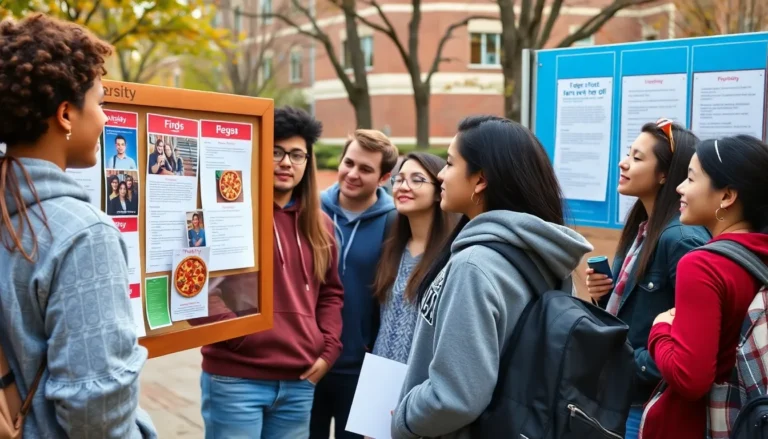Planning a family vacation with young adults can feel like herding cats—funny, chaotic, and occasionally a bit hair-raising. Yet, these trips offer a unique chance to bond and create unforgettable memories together. Imagine swapping stories over dinner, laughing at inside jokes, and discovering new destinations as a team.
Table of Contents
ToggleImportance of Family Vacations With Young Adults
Family vacations with young adults serve as a vital opportunity for connection. They facilitate the strengthening of family bonds, allowing members to share experiences in a relaxed setting. Engaging in joint activities promotes teamwork and fosters communication. Furthermore, memorable experiences gained during these trips enhance relationships and encourage support among family members.
Traveling together exposes everyone to diverse cultures and environments. Exploring new destinations creates shared adventures, which become stories to tell for years. Young adults often bring fresh perspectives to family dynamics, inviting meaningful discussions. These conversations can revolve around life choices and aspirations, leading to a deeper understanding of each family member’s journey.
Participating in family vacations also cultivates responsibility among young adults. Handling travel logistics like accommodations and itineraries encourages independence. This newfound capability equips them with essential skills for future endeavors. Prioritizing quality time together emphasizes the importance of family connections amidst busy schedules.
Finally, family vacations contribute to emotional well-being. Shared laughter and unforgettable moments create a sense of belonging and security. Those interactions play a crucial role in reinforcing familial love and support. Building these foundations enhances the resilience of family units over time.
Planning the Perfect Trip

Planning a trip with young adults incorporates their interests and preferences. Collaboration leads to a more enjoyable experience for everyone involved.
Involving Young Adults in Decision Making
Involving young adults instills a sense of ownership over the vacation. They should participate in discussions about destinations and activities. Ask for their input on itineraries and accommodations. Listening to their ideas fosters engagement and strengthens bonds. Discussions that include their favorite activities create excitement. Encouraging them to research destinations empowers decision-making. Their perspectives can influence choices and enhance the overall experience.
Choosing the Right Destination
Selecting the right destination plays a crucial role in trip satisfaction. Consider locations that appeal to young adults, offering diverse activities. Urban settings provide vibrant nightlife and cultural experiences, while nature retreats offer adventure and relaxation. Balance preferences for excitement and relaxation ensures everyone has something to enjoy. Researching potential destinations as a group yields valuable insights. Ultimately, choosing a destination that aligns with collective interests leads to lasting memories. Prioritize locations that foster connection and exploration to maximize family bonding opportunities.
Activities That Cater to Young Adults
Family vacations should include activities that resonate with young adults. Engaging them in diverse experiences helps create memorable moments.
Outdoor Adventures
Outdoor adventures captivate the energy and curiosity of young adults. Hiking scenic trails offers a chance to explore nature while enjoying each other’s company. Water sports, such as kayaking or paddleboarding, provide an adrenaline rush combined with teamwork. Camping trips immerse families in outdoor living, fostering camaraderie through shared responsibilities. Exploring national parks, with their stunning landscapes, invites meaningful conversations and photo opportunities. Such activities encourage physical fitness while fostering family bonds.
Cultural Experiences
Cultural experiences enrich family vacations for young adults. Visiting local historical sites sparks interest in a destination’s heritage and provides insightful discussions. Attending festivals showcases regional traditions and cuisines, allowing families to bond over new flavors. Art galleries and museums promote creativity and thought-provoking conversations. Cooking classes empower young adults to experiment with local recipes, fostering team collaboration. Each cultural outing offers a unique chance to learn and grow together, reinforcing family connections through shared experiences.
Balancing Family Time and Independence
Families can maintain a healthy mix of togetherness and personal freedom during vacations. Achieving this balance enhances relationships while allowing young adults to explore their individuality.
Setting Boundaries
Establishing clear boundaries creates a respectful atmosphere where everyone feels comfortable. Families can agree on daily schedules, including meal times and group activities, to ensure some structure. It’s beneficial to set expectations for communal spaces, like shared lodgings, defining quiet hours or personal time. By discussing preferences before the trip, family members gain insight into each other’s needs and can respect these guidelines. Communicating openly helps minimize potential conflicts, leading to a more enjoyable experience for all.
Allowing Personal Time
Encouraging personal time fosters independence and promotes relaxation among family members. Young adults should feel free to pursue individual interests during the trip, whether exploring local attractions or enjoying leisure activities. Dedicating specific times for personal exploration boosts excitement and allows for reflection on experiences. Families can designate periods for solo adventures while agreeing to meet up for meals or evening activities. Promoting this sense of autonomy enriches the vacation, offering young adults the opportunity to develop confidence in navigating new environments while still staying connected with family.
Tips for a Memorable Experience
Engaging young adults in the planning process fosters investment. Involve them by discussing destination options and potential activities. This collaboration increases excitement and ensures everyone’s preferences get considered.
Choosing a destination rich in diverse activities appeals to different interests. Locations that offer outdoor adventures, cultural experiences, and relaxation options enhance overall satisfaction. Prioritizing locations that cater to young adults expands bonding opportunities for the entire family.
Creating a balanced itinerary promotes both family bonding and personal independence. Allocate time for group activities alongside designated periods for solo exploration. This structure allows young adults to engage in personal interests while spending quality time with family.
Establishing clear communication on daily schedules sets expectations. Use shared planning tools, like apps or group chats, to manage schedules and activities seamlessly. This approach minimizes misunderstandings and maintains a respectful atmosphere.
Encouraging informal gatherings during downtime amplifies connection. Share stories, play games, or cook meals together to strengthen relationships. These moments often create cherished memories that last well beyond the trip.
Adjusting to individual needs during vacations fosters a positive environment. Recognizing when someone needs a break or wants to pursue their interests strengthens family dynamics. Flexibility contributes to an enriching experience for everyone.
Continuing meaningful conversations during trips deepens understanding. Discuss life choices and aspirations in relaxed settings, inviting everyone to share their thoughts. These dialogues promote personal growth and strengthen family bonds through shared insights.
Conclusion
Family vacations with young adults can be a rewarding experience filled with laughter and adventure. These trips not only provide opportunities for bonding but also allow families to navigate the complexities of relationships in a relaxed setting.
By engaging young adults in the planning process and balancing group activities with personal time, families can create an atmosphere of excitement and connection. The shared stories and experiences from these vacations contribute to lasting memories that strengthen familial ties.
Ultimately, embracing the chaos and joy of traveling together fosters growth and understanding among family members, ensuring that each trip becomes a cherished chapter in their shared journey.



